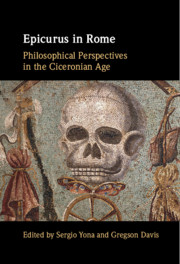Book contents
- Epicurus in Rome
- Epicurus in Rome
- Copyright page
- Contents
- Illustrations
- Contributors
- Acknowledgements
- Chapter 1 Introduction
- Part I Epicurus and Roman Identities
- Chapter 2 Sint Ista Graecorum: How to be an Epicurean in Late Republican Rome – Evidence from Cicero’s On Ends 1–2
- Chapter 3 Cicero’s Rhetoric of Anti-Epicureanism: Anonymity as Critique
- Chapter 4 Was Atticus an Epicurean?
- Chapter 5 Caesar the Epicurean? A Matter of Life and Death
- Chapter 6 Otium and Voluptas: Catullus and Roman Epicureanism
- Part II Epicurus and Lucretian Postures
- Bibliography
- General Index
Chapter 4 - Was Atticus an Epicurean?
from Part I - Epicurus and Roman Identities
- Epicurus in Rome
- Epicurus in Rome
- Copyright page
- Contents
- Illustrations
- Contributors
- Acknowledgements
- Chapter 1 Introduction
- Part I Epicurus and Roman Identities
- Chapter 2 Sint Ista Graecorum: How to be an Epicurean in Late Republican Rome – Evidence from Cicero’s On Ends 1–2
- Chapter 3 Cicero’s Rhetoric of Anti-Epicureanism: Anonymity as Critique
- Chapter 4 Was Atticus an Epicurean?
- Chapter 5 Caesar the Epicurean? A Matter of Life and Death
- Chapter 6 Otium and Voluptas: Catullus and Roman Epicureanism
- Part II Epicurus and Lucretian Postures
- Bibliography
- General Index
Summary
This chapter claims that Atticus offers a fruitful case study of Epicureanism in the late Republic and can thereby contribute to broader questions of philosophical allegiance in the ancient world. There has, of course, been valuable discussion of philosophical allegiance in recent years. A reconsideration of Atticus’ Epicureanism will fruitfully extend these debates precisely because he is a not a perfect fit for any of these categories. He was not a professional philosopher; in any case, it is dangerous to assume that the thunderings of Lucretius or Philodemus on the Epicurean wise man map reliably onto the complexities of life, especially in the case of Atticus.
- Type
- Chapter
- Information
- Epicurus in RomePhilosophical Perspectives in the Ciceronian Age, pp. 55 - 71Publisher: Cambridge University PressPrint publication year: 2022
- 1
- Cited by

